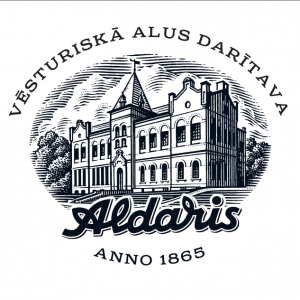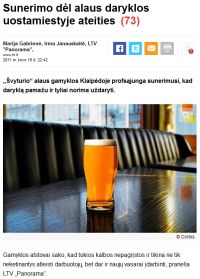This case study explains one of the propaganda technologies used to manipulate public opinion.
A half-truth is a deceptive statement that includes some element of truth. (Wikipedia)
 Beer industry is under constant competitive pressure worldwide. During1990-ies Carlsberg came into the Baltic markets via acquisitions of local breweries – Saku (1991, Estonia), Aldaris (1992, Latvia), Utena (1997, Lithuania) and Švyturys (1999, Lithuania). Initially all of them were owners of local brands, but due to comparatively small markets concentration was inevitable.
Beer industry is under constant competitive pressure worldwide. During1990-ies Carlsberg came into the Baltic markets via acquisitions of local breweries – Saku (1991, Estonia), Aldaris (1992, Latvia), Utena (1997, Lithuania) and Švyturys (1999, Lithuania). Initially all of them were owners of local brands, but due to comparatively small markets concentration was inevitable.
Closing down Aldaris in Latvia
Case of Aldaris factory closure was presented at Baltic PR Awards 2014, where it achieved 2nd place in Corporate Communication category with a case named “Communication of Aldaris Business Strategy Change”.
As the story continues, the company keeps to it’s promises – opens museum in April 2015, aims for a small volume production.
Latvian best-practice is in the process of multiplication in Lithuania
As from corporate perspective decision to take similar path in neighbouring country was easy and well argued. A single production line can easily cover all Baltic states from one production plant. But at the same time such decision marks the need for a careful preparation on labor, branding and other potential conflicting issues.
Meantime from consumer perspective a beer produced in his town and brought from another country (even from another side of the same country) is a completely different issue. Not to forget hard competition from smaller local breweries.
 It is even more important, when media in Lithuania as early as 2011 was reporting about Švyturys’ trade union, which was warning about corporate plans to discontinue beer production in Klaipėda plant and move it to Utena.
It is even more important, when media in Lithuania as early as 2011 was reporting about Švyturys’ trade union, which was warning about corporate plans to discontinue beer production in Klaipėda plant and move it to Utena.
Deconstruction of a Half-truth
From a public relations perspective Carlsberg Group strategy consist of simple idea:
- announce a nice-to-have target (beer museum, craft beer production line etc.)
- present a clear road map to reach it
- make sure the target implies at least temporal closure of ongoing production
- be unclear what would the future production look like, do not expand on the lay-offs and/or other trade-union related issues
In Lithuania, where Švyturys has a lengthy history of sponsorships with the “sacred” national basketball team, it is a rare thing to notice something negative about the company, therefore no tough questions were to be expected.
Such was a best-practice plan to be used in Lithuania and it went just so… Major news portals simply used corporate press release and had not a single doubt about the true nature of the initiative.

Conclusions?
We cannot stipulate, whereas reconstruction will be real or just a simple lie to calm down potential negative public reactions. In any case, as long as today no voice from trade unions, market analysts or NGO’s has troubled the corporation in it’s quest to solve a difficult corporate development issue without any public resistance.
Looking from a civil society perspective questions still remain untouched – are public media still our watchdogs?


Leave a Reply